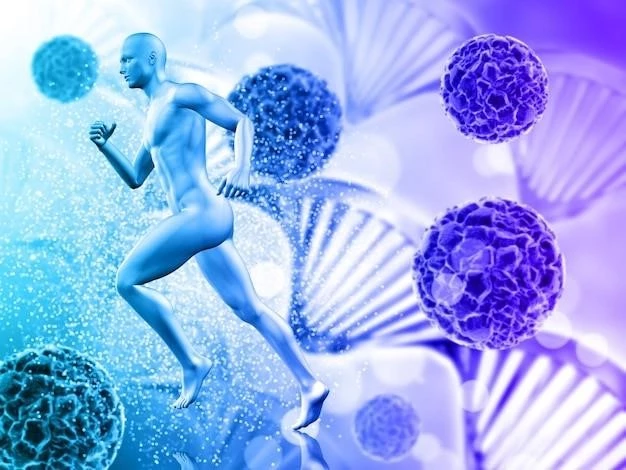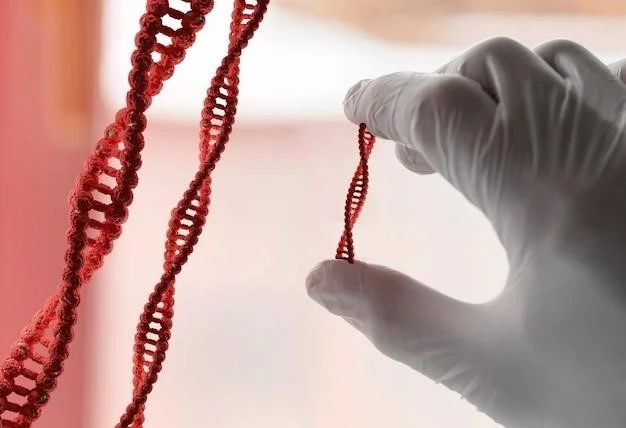Understanding Chromosome 18 Mosaic Monosomy
Causes of Chromosome 18 Mosaic Monosomy⁚ Understanding the genetic origins and factors contributing to this condition is crucial for comprehensive awareness and management.
Causes of Chromosome 18 Mosaic Monosomy
Chromosome 18 mosaic monosomy is typically caused by errors in cell division that result in the loss of genetic material from chromosome 18 in a percentage of cells. This condition arises randomly and is not inherited from parents. Factors such as advanced maternal age may slightly increase the risk. Understanding these genetic mechanisms can provide insights into the condition’s development and inform healthcare decisions.
- Random errors in cell division leading to loss of genetic material on chromosome 18
- Not inherited from parents
- Slightly increased risk associated with advanced maternal age
By being aware of these causes‚ individuals impacted by chromosome 18 mosaic monosomy and their families can work closely with healthcare professionals to better manage the condition.
Symptoms and Diagnosis of Mosaic Monosomy
Understanding the symptoms and diagnosis process of chromosome 18 mosaic monosomy is crucial for early detection and management. Common symptoms may include developmental delays‚ intellectual disabilities‚ facial abnormalities‚ and organ defects. Diagnosing mosaic monosomy usually involves genetic testing‚ physical examinations‚ and evaluations by specialists. Early diagnosis allows for timely interventions and support‚ contributing to better outcomes and quality of life.
- Developmental delays
- Intellectual disabilities
- Facial abnormalities
- Organ defects
By recognizing these symptoms and understanding the diagnostic procedures‚ individuals and families can collaborate effectively with healthcare providers to create personalized care plans that address the unique needs associated with chromosome 18 mosaic monosomy.
Treatment Options for Chromosome 18 Monosomy
Exploring treatment options for chromosome 18 monosomy involves a multidisciplinary approach aimed at addressing individual needs and symptoms. While there is no specific cure for this genetic condition‚ management focuses on supportive therapies and interventions to enhance quality of life. Treatment may include early interventions for developmental delays‚ educational support‚ physical and occupational therapy‚ and medical management of associated health issues. Collaborating with healthcare professionals and specialists can help tailor a care plan that best suits the individual’s requirements.
- Supportive therapies to manage symptoms
- Early interventions for developmental delays
- Educational support
- Physical and occupational therapy
- Medical management of health issues
By staying informed about available treatment options and actively participating in the decision-making process‚ individuals with chromosome 18 monosomy can optimize their well-being and lead fulfilling lives with appropriate support and care.
Living with Chromosome 18 Mosaic Monosomy
Embracing life with chromosome 18 mosaic monosomy involves focusing on holistic care and support. Individuals and families navigating this genetic condition may encounter various challenges related to physical and intellectual development. It is essential to foster a nurturing environment that promotes independence and well-being. Engaging in therapies‚ educational programs‚ and social activities tailored to individual needs can enhance overall quality of life. By fostering a supportive network and leveraging available resources‚ individuals with chromosome 18 mosaic monosomy can thrive and lead fulfilling lives.
- Focus on holistic care and support
- Promote independence and well-being
- Engage in tailored therapies and educational programs
- Participate in social activities that enhance quality of life
- Build a supportive network for continued growth and development
By embracing a positive and proactive approach to living with chromosome 18 mosaic monosomy‚ individuals can achieve their full potential and navigate challenges with resilience and determination.
Genetic Counseling for Mosaic Monosomy
Genetic counseling plays a vital role in supporting individuals and families affected by chromosome 18 mosaic monosomy. Through genetic counseling sessions‚ individuals can gain valuable information about the condition‚ its inheritance patterns‚ and potential risks. Counseling sessions also provide emotional support‚ facilitate informed decision-making regarding family planning‚ and help navigate available resources and support services. By engaging in genetic counseling‚ individuals can better understand the implications of chromosome 18 mosaic monosomy and make informed decisions that align with their unique circumstances.
- Receive information about the condition and inheritance patterns
- Emotional support during decision-making processes
- Guidance on family planning considerations
- Access resources and support services
By actively participating in genetic counseling‚ individuals and families can empower themselves with knowledge‚ emotional support‚ and practical tools to navigate the complexities associated with chromosome 18 mosaic monosomy.
Research Advances in Chromosome 18 Monosomy
Keeping abreast of the latest research developments in chromosome 18 monosomy is crucial for understanding advancements in diagnostics‚ treatments‚ and potential interventions. Ongoing research contributes to expanding knowledge about the condition‚ identifying new therapeutic approaches‚ and improving quality of life for affected individuals. By staying informed about research studies‚ clinical trials‚ and emerging technologies‚ individuals‚ families‚ and healthcare providers can actively participate in shaping the future of care for chromosome 18 monosomy. Collaboration with research institutions and advocacy groups can also provide opportunities to contribute to scientific progress and enhance outcomes for those impacted by this genetic condition.
- Stay informed about advancements in diagnostics and treatments
- Explore new therapeutic approaches and interventions
- Participate in research studies and clinical trials
- Collaborate with research institutions and advocacy groups
By engaging with the evolving landscape of research in chromosome 18 monosomy‚ individuals can play an active role in fostering innovation‚ improving care options‚ and enhancing the overall well-being of those living with this condition.
Support Resources for Individuals with Mosaic Monosomy
Accessing support resources can significantly enhance the quality of life for individuals with chromosome 18 mosaic monosomy and their families. Various support services‚ such as patient advocacy organizations‚ community support groups‚ and online forums‚ offer valuable emotional support‚ information sharing‚ and connections with others facing similar challenges. Additionally‚ seeking assistance from healthcare professionals‚ social workers‚ and special education programs can provide tailored support to address specific needs associated with the condition. By utilizing available support resources‚ individuals can build a strong support network‚ gain valuable insights‚ and navigate their journey with chromosome 18 mosaic monosomy more effectively.
- Connect with patient advocacy organizations and support groups
- Engage in online forums for information sharing
- Seek assistance from healthcare professionals and social workers
- Access special education programs
By actively engaging with diverse support resources‚ individuals with chromosome 18 mosaic monosomy can find guidance‚ encouragement‚ and practical assistance to help them lead fulfilling and empowered lives.
Understanding the Genetics of Chromosome 18 Monosomy
Gaining insights into the genetics of chromosome 18 monosomy is essential for a comprehensive understanding of this condition. Chromosome 18 is one of the 23 pairs of chromosomes in humans‚ and monosomy refers to the presence of only one copy of this chromosome instead of the usual two. This genetic anomaly can lead to various physical and developmental challenges. Understanding the specific genes located on chromosome 18 and how their loss impacts health and development is key to understanding the complexities of this condition. By delving into the genetic basis of chromosome 18 monosomy‚ individuals and healthcare providers can better tailor treatment approaches‚ offer appropriate support‚ and enhance outcomes for affected individuals.
- Chromosome 18 is one of the 23 pairs of human chromosomes
- Monosomy refers to having only one copy of chromosome 18
- Loss of genetic material on chromosome 18 can lead to challenges
- Understanding specific genes on chromosome 18 is crucial
By deepening their understanding of the genetics underlying chromosome 18 monosomy‚ individuals can make informed decisions‚ access appropriate care‚ and work towards optimizing health and well-being in the context of this genetic condition.

